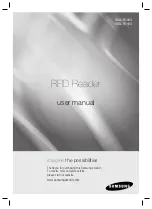
1MAC052634-MB D
Section 3
Vendor-specific implementation
615/620 series ANSI
21
Communication Protocol Manual
Table 10:
Time structure data
Table 11:
Time quality register
3.3.6
Control operations
Refer to the Modbus control objects' memory map for the available control objects.
Control operations are supported via the 4X registers.
The control objects in this IED are either single point or double point control objects.
Single point control object output types
Single point control objects can be either pulse outputs or persistent outputs.
The Modbus client can only write “1” to the pulse outputs. This write operation activates
the control operation and there is no need for the Modbus client to ever write “0” to the
object.
The Modbus client can write both “1” and “0” to the persistent outputs. Therefore, the
persistent outputs have two defined levels: “0” and “1”.
Most of the outputs in this IED are pulse outputs.
Control operation modes
This IED supports two control models: direct-operate and select-before-operate. The
single point control objects in this IED are of direct-operate type. The double point control
objects can be configured either into the direct-operate or select-before-operate mode.
Address
Register
Values
Comment
N
TimeStamp
(Year,Month)
High byte:year, low
byte:month
N+1
TimeStamp (Day,Hour)
High byte:day, low
byte:hour
N+2
TimeStamp (Min,Sec)
High byte:min, low
byte:seconds
N+3
TimeStamp
(Milliseconds)
Word: milliseconds
N+4
Time quality
See the table about time
quality register
Bit
Meaning
Values
15
Time format
0 = Local time
1 = UTC time
14
Time source
0 = Internal (RTC)
1 = Modbus stack
13
RTC not synchronized
0 = RTC synchronized
1 = Not synchronized
12
RTC Failure
0 = RTC OK
1 = RTC failure
11...0
Not used
0
















































